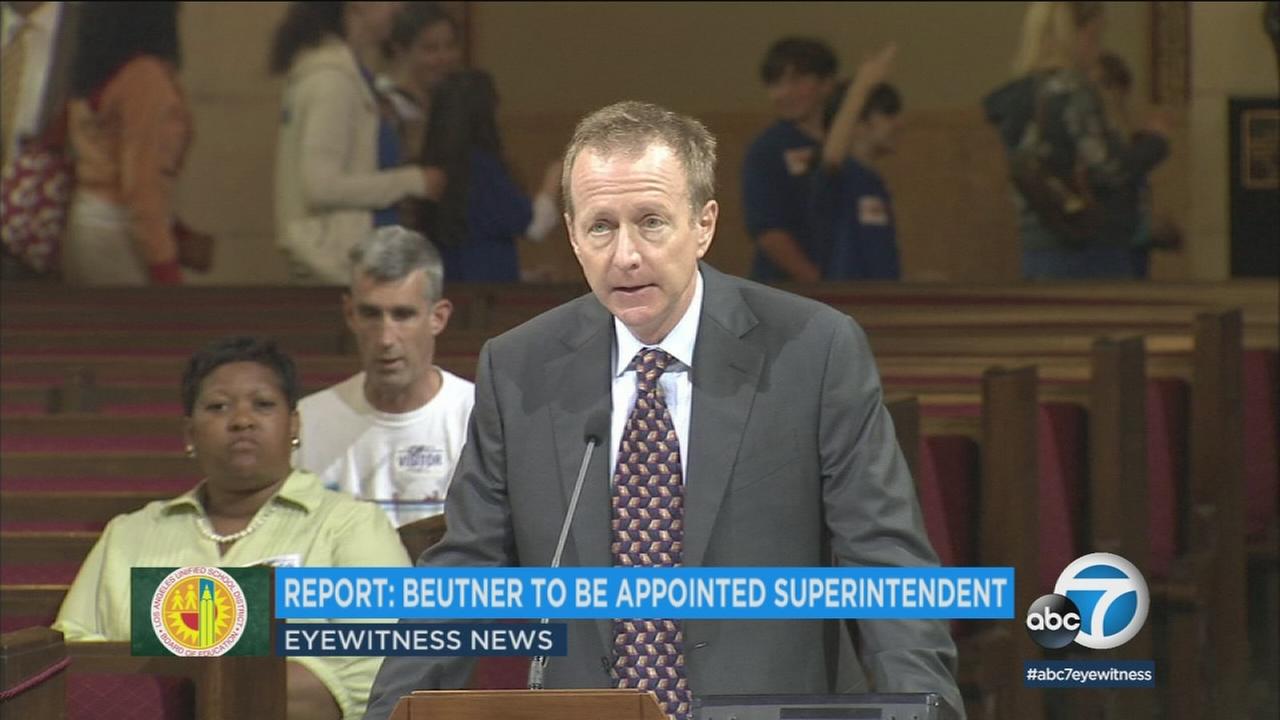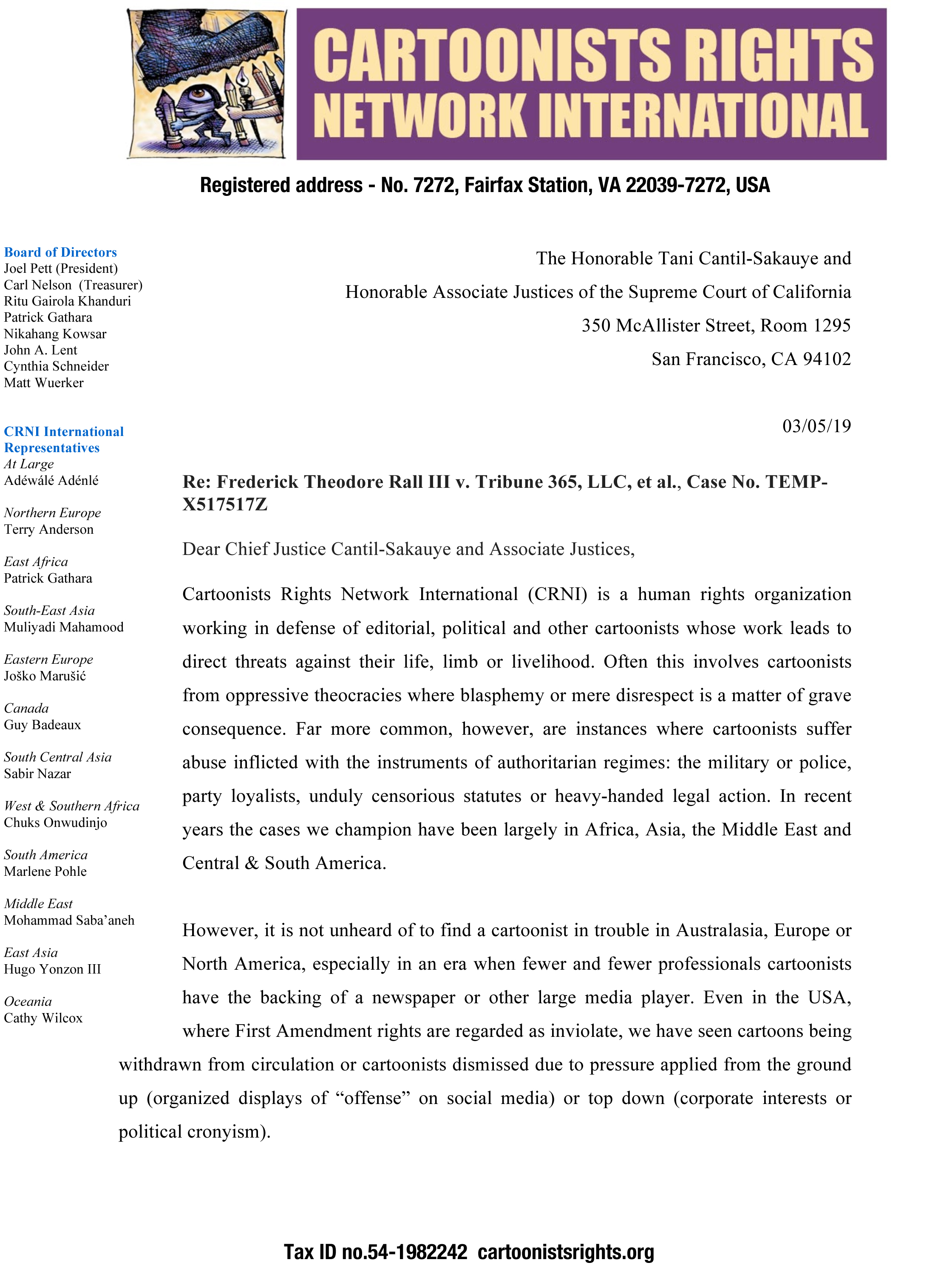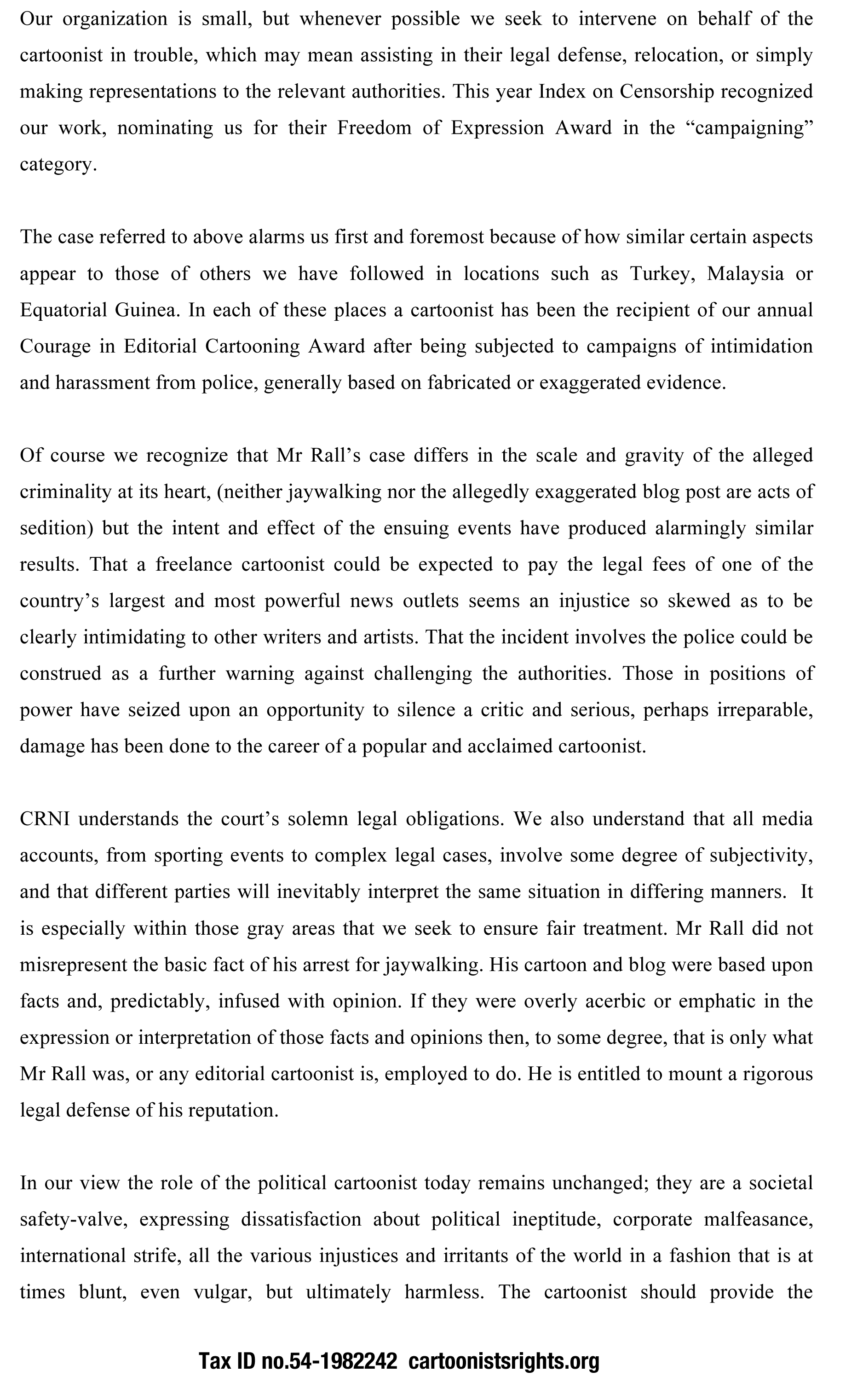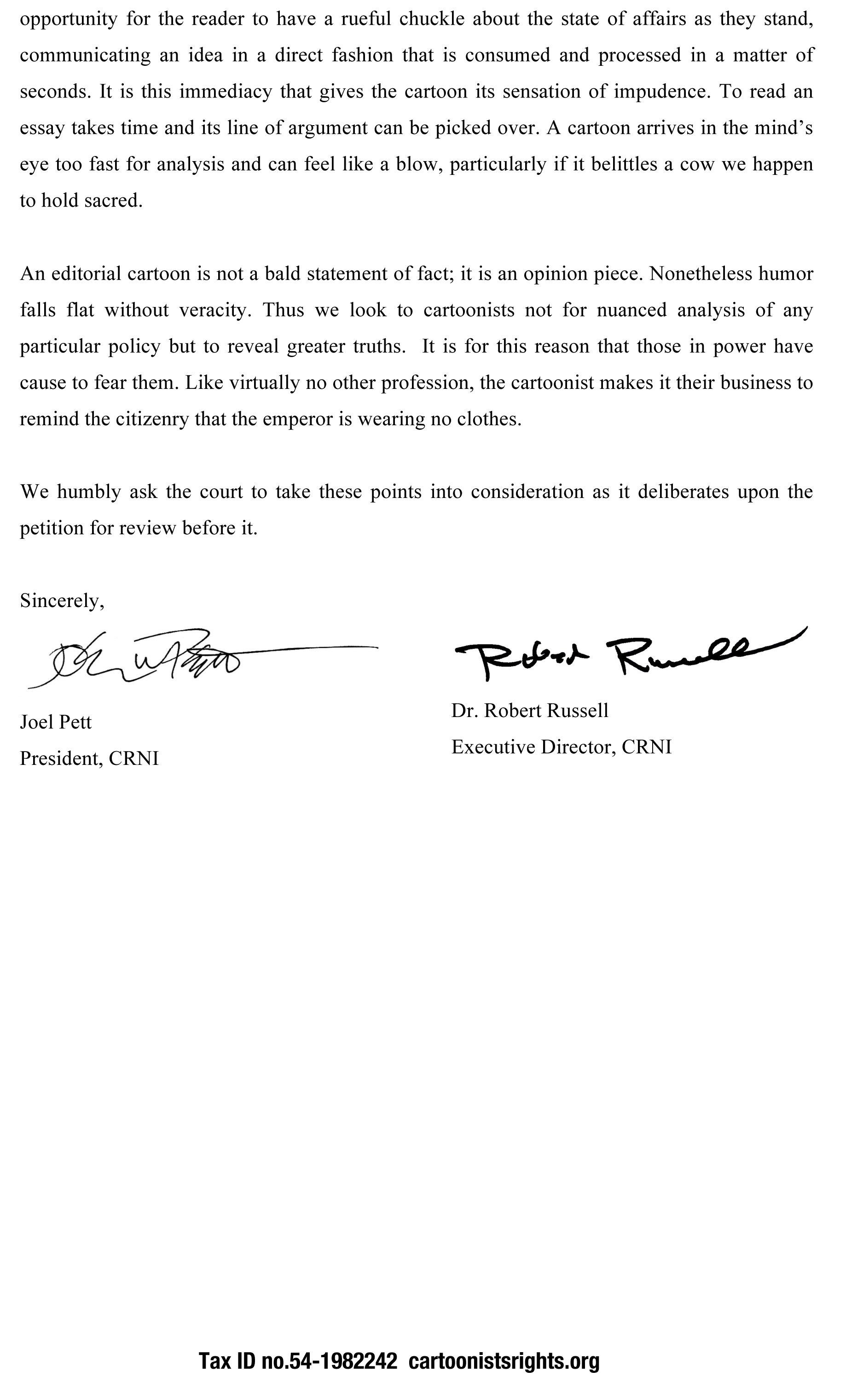National Coalition Against Censorship Joins Groups Opposing LA Times in Ted Rall Lawsuit
Thanks also to the National Coalition Against Censorship for filing an Amicus Letter on my side with the California Supreme Court as I defend myself against the LA Times and its billionaire owner, which are trying to bankrupt me because I criticized their close political ally and former business partner, the LAPD.
Cartoonists Rights Network International Supports Ted Rall Against LA Times
Thank you to Cartoonists Rights Network International for supporting my lawsuit against the LA Times with an Amicus Letter to the California Supreme Court.
Turkey, Malaysia, Equatorial Guinea…and Los Angeles? Cartoonists Rights Network International compares how the LAPD corrupted the LA Times in my case to those countries. Meanwhile billionaire Dr. Patrick Soon-Shiong (owner of LA Times) still wants me to pay him hundreds of thousand$!
Rall v. LA Times Lawsuit News: We Have Appealed to the California Supreme Court
Whether journalists in California will keep basic employment protections and whether libel will remain actionable are now important issues in the hands of the California state Supreme Court. We filed our Petition to Review with the court yesterday. Please read it here. It’s a good primer about an important case. And please wish me luck. I need it!
Thank you for your continued support.
Journalists Had Better Hope I Win My Case Against the Billionaire-Owned L.A. Times

I have written extensively about my lawsuit against the LA Times. As I prepare for the next, do-or-die, stage of my case, it’s time to explain why Rall v. Los Angeles Times et al. has broad implications beyond me personally.
Freedom of the press is at stake.
The subtle yet fundamental question here is: who needs freedom of the press? The obvious answer is journalists: reporters and pundits. But journalists’ freedom to report and editorialize is in grave danger from a surprising enemy: their employers.
Once was, reporters like Woodward and Bernstein were on the same side as their employers. In this age of corporate aggregation of newspapers and other media outlets by publicly-traded media corporations and individual billionaires, however, newspapers and other media outlets are often compromised by their quest for profits, as the LA Times’ parent company was when it allowed its stock to be sold to the LAPD pension fund. In this struggle the media companies have framed themselves as guardians of press freedom at the expense of journalists, ironically securing the power to screw journalists in the guise of First Amendment protections.
If the California Supreme Court refuses to hear my case — which is probably what will happen — or hears it and rules for the Times’ anti-SLAPP motion against me, the court will send a chilling message to journalists and pundits across the country. Most Americans, and most reporters, live in states with anti-SLAPP statutes modeled on California’s.
The threat to journalists is unmistakable: rock the boat and you risk being destroyed.
Write an article critical of a powerful institution like the LAPD, the nation’s highly militarized, largest and most brutal police forces, controlling a $16 billion pension fund, and they can pull strings to get you fired. It can also happen in a tiny town like Baker City, Oregon.
Even worse, you can’t find another job because they use falsified “evidence” to smear your reputation for honesty. Even if you can prove that it’s BS — as I did — media companies use their editorial endorsements of jurists and politicians to rig the courts with their allies so you, the victim, get dunned hundreds of thousands of dollars for the villainous media company’s legal fees!
I have advice for journalists thinking about covering police abuse: don’t. The price for doing your job — termination, defamation and bankruptcy — isn’t worth it.
If I could go back to 2015 when the LAPD-owned LA Times trashed my reputation in service to a thin-skinned police chief, I would not draw or write anything about the cops. It’s too dangerous.
I have learned how big media companies have stacked the bench with sympathetic judges, lobbied for laws that protect them from accountability for breaking the law and used their influence to crush individual journalists for such crimes as reporting the news or having worked long enough to earn a high salary. The system doesn’t even pretend to be fair. Many judges are former prosecutors; how can they justify not recusing themselves from cases involving the cops?
Now there is a $330,000 judgment against me for having the gall to defend my reputation in court. Unless the California Supreme Court overrules it, that judgment will be final and will grow bigger. Journalists and pundits aren’t covering my case — they’re afraid, as they ought to be — but they are watching. If the judgment stands, who will be stupid enough to take on the LAPD or similar institution?
As if the chilling effect on journalists wasn’t enough reason to watch my case, the Times is arguing (so far, successfully) that media companies should no longer extend protections against discrimination by gender, age and sexual orientation to their workers. Unless the court overturns the lower court rulings against me, the door will be pushed open for the Times and other California media corporations to fire, say, its African-American or transgender employees without redress in the courts.
Then there’s the damage to defamation law. For hundreds of years it has been possible for a person wrongfully slimed by a news publication to go to court to try to clear their name. Abusive anti-SLAPP motions have made a mockery of libel law to the point that the National Enquirer, represented by the same lawyer as the Times, falsely claimed Richard Simmons had become a transsexual woman and Simmons was ordered to pay $130,000 to the Enquirer!
It should be challenging to sue for libel, not impossible.
“The quote/unquote truth doesn’t matter,” Los Angeles Times/National Enquirer lawyer Kelli Sager said in court. So far, she’s been right. Judges have bent over backwards to believe the Times’ many lies and ignore the plain truth right in front of them. Hopefully a court outside LA will let me get my day in court.
(Ted Rall, the cartoonist, columnist and graphic novelist, is the author of “Francis: The People’s Pope.” You can support Ted’s hard-hitting political cartoons and columns and see his work first by sponsoring his work on Patreon.)
Here’s the Audio of the recent Oral Arguments in Ted Rall v. Los Angeles Times
Listen for yourself to the oral arguments in the most recent Ted Rall v. Los Angeles Times anti-SLAPP hearing. I’m defending myself against Dr. Pat Soon-Shiong and the LA Times’ defamation as a favor to the LAPD.
SYNDICATED COLUMN: Austin Beutner: L.A.’s Creepy New School Superintendent Keeps Failing Up, Leaving Destruction in His Wake

The Los Angeles Unified School District faces big problems. Magnet schools and second language programs have failed to slow declining enrollment; each of the 12,000 kids who pulls out this year means less state funding. The sprawling bureaucracy seems unable or unwilling to respond to chronic bullying centered in the elementary schools. L.A. United is in the peculiar position of raising its budget — most recently to $7.5 billion — while still having to cut back support personnel.
L.A. Unified requires strong, decisive leadership by an education expert in it for the long haul. The last thing the district and its 640,000 students need is a narcissist dilettante with one agenda: prettying up his resume. But that’s what it’s getting in the form of Austin Buetner.
The shadowy 58-year-old hedge fund billionaire and philanthropist, a self-declared political nonpartisan (but Bill Clinton ally) who began accruing his fortune making shady investments amid the ashes of the collapsed Soviet Union under Boris Yeltsin and co-founded the shady boutique investment and consulting company Evercore Partners, recently got the nod from the school board to take charge of L.A. United’s nearly one thousand schools as superintendent. Scratch the thin surface of Beutner’s resume, however, and what you find is a Hillary Clinton-like predilection for failing upward.
“Cynics might look at Beutner’s conquest of Los Angeles — the fastest takeover of a major global city since the Visigoths sacked Rome — and suggest that Southern California’s institutions must be awfully weak to keep seeking the services of the same finance guy,” Joe Mathews sardonically observed in The San Francisco Chronicle. “They might question why he keeps getting jobs while only staying in previous ones for a short time (a year or so) and without producing a record of sustained success.”
Beutner’s first major foray into public service was as deputy mayor, but he only lasted a year at City Hall. He quit to run for mayor, but gave that up when it became clear that his candidacy had fewer takers than New Coke.
In 2014 Beutner, who had no journalistic experience and as far as we know has never even delivered a newspaper, was named publisher of The Los Angeles Times, following more than a decade of brutal budget cuts, declining circulation and diminishing relevancy. No one but the man himself knows why he wanted the job; Southland political observers theorized that he wanted to leverage the editorial page to run for mayor again or perhaps for California governor. To be fair, no one man could have fixed what ailed the Times after its long gutting — but if such a miraculous creature existed, it wasn’t Austin Beutner.
The problem as always for Beutner is that while he knows how to slap backs and twist arms in the toniest corridors of power, he has no natural political constituency amid the electorate. He “lacks…name recognition,” the Times drily reported during Beutner’s aborted 2011 mayoral run.
Disclosure: Violating journalism’s traditional wall between the editorial and business sides of the operation, Beutner fired me as the newspaper’s editorial cartoonist as a favor to his biggest political ally, LAPD Chief Charlie Beck, because I had made fun of the cops. Overeager to please the fuzz, he even published a pair of articles about me that pretty much defined the word libel. I’m suing him and the Times for defamation and wrongful termination.
Beutner’s dealings with the LAPD, whose pension fund purchased substantial shares of the Times’ parent company during the short Beutner era, may be one of many moving parts of what school board member Scott Schmerelson, who voted against Beutner for the superintendent post, was referencing when he complained that the board majority failed “to exercise due diligence regarding Mr. Beutner’s lengthy and tangled business affairs.” Quoting Schmerelson, the Times lazily allowed: “Schmerelson did not cite an example, but Beutner, who is wealthy, has wide-ranging investments and a complex business background.”
To say the least.
Just over a year after taking the helm at Times Mirror Square, Beutner brazenly attempted a failed boardroom coup to seize both the Times and the San Diego Union-Tribune from the clutches of the Chicago-based Tribune Publishing (now known as Tronc). The Tribbies were so appalled that they ordered him unceremoniously removed with his banker’s box full of office supplies, turning off his Times email account so he had to send his farewell via Facebook.
Now this creepy dude is running the schools. Which prompts a few questions.
Beutner is loaded. He doesn’t need the job. Why does he want it? (Although he’s apparently not so much of a billionaire that he turned down the job’s $350,000-a-year paycheck.)
Will he last more than a year this time?
Will there be parent-political blowback from the, to be charitable, less than transparent way that he won the support of the school board over Vivian Ekchian, the incumbent interim superintendent and career educator?
Asked the first question, Beutner responded, as he often does, with a stream of pablum: “It’s about the kids. My own roots, my mom was a teacher, my dad worked very, very hard to make sure that I had a great public education. It’s that common place — it’s the community place, the commonplace, the community connects. And if we can provide students that same opportunity I had with a great public education, what a gift, what an honor to be able to work towards that.”
In other words, who knows what Austin wants? The most obvious answer is that Beutner is a wannabe political animal who recognizes his biggest political problem: no one knows who he is. Being perceived as having turned around the schools might be leveraged into a mayoral or even gubernatorial run. Perhaps he’ll want to connect his business allies to lucrative contracts supplying the district; if so, he would merely be following up such fiascoes as the district’s 2013 plan to issue iPads to every student, which devolved into scandal. Beutner is a proponent of charter schools, but he faces a dilemma there: every student who transfers to a charter school takes away more revenue from the traditional institutions.
The Beutner-aligned Southern California media universe isn’t spilling much ink on the aftermath of the Ekchian snub. But a lot of parents, not to mention women reveling in the #MeToo movement, felt rubbed the wrong way by the appointment of a rich white male educational neophyte over a woman with 32 years of experience working within L.A. Unified, where she began as a teacher assistant.
“The man you’re about to choose has no history of success anywhere,” warned ex-school board president Jeff Horton. “What that says to all of the educators that you depend on to deliver your product is, ‘We don’t really care whether a person knows about education. We have other criteria — which are connected with our donors and our backers.’” The majority in the 5-2 vote received a total of $15 million in donations from the charter lobby.
One thing is certain: even for a miracle worker, it will take a lot longer than Beutner’s usual year-long tenure to demonstrate significant improvement in the district. Times columnist Steve Lopez lists the issues: “Falling enrollment, rising pension and healthcare costs, academic struggles, billions in deferred building maintenance at hundreds of schools, political division on the board and an ongoing philosophical difference between charter school supporters and those who believe they are draining traditional schools staffed by union teachers.”
Here’s the rub: even if Beutner somehow manages to make a dent in L.A. Unified’s longstanding problems, there’s no metric in place to judge success that everyone agrees upon. Knowing Beutner — as you can imagine, I’ve studied him closely — I’d lay better-than-even odds that, as ever in search of a quick score to pump up his political prospects, he’ll throw up his hands and walk away again before long.
(Ted Rall (Twitter: @tedrall), the political cartoonist, columnist and graphic novelist, is the author of “Francis: The People’s Pope.” You can support Ted’s hard-hitting political cartoons and columns and see his work first by sponsoring his work on Patreon.)
Ted Rall vs. LA Times: Here’s Rall’s Appellate Brief Challenging the Times’ Nasty, Abusive “anti-SLAPP” Motions
Yesterday my attorneys filed, and California’s Court of Appeals accepted, our Appellate Brief in my defamation and wrongful termination lawsuit against the Los Angeles Times et al.
I sued in 2015. The Times filed three anti-SLAPP motions against me, halting the case because they’re scared of facing a jury and want to intimidate me. In 2017 a lower-court judge ruled for the Times, ordering me to pay them $350,000 in the Times’ attorneys fees. This document is our appeal of the 2017 decision.
If successful, the $350,000 judgement will be vacated and I can build my case to take to a jury.
If not, the $350,000 stands, plus more fees for the Times defense of this appeal. And my case dies. And Californians who work for media companies will have no recourse in the courts if their employer discriminates against them, even if they do so for racist or sexist or homophobic reasons.
Please read our brief below; it’s an interesting read. I look forward to hearing your thoughts and reactions. Thank you for your incredible support!
Ted Rall vs. Los Angeles Times: anti-SLAPP Appellate Brief by Ted Rall







